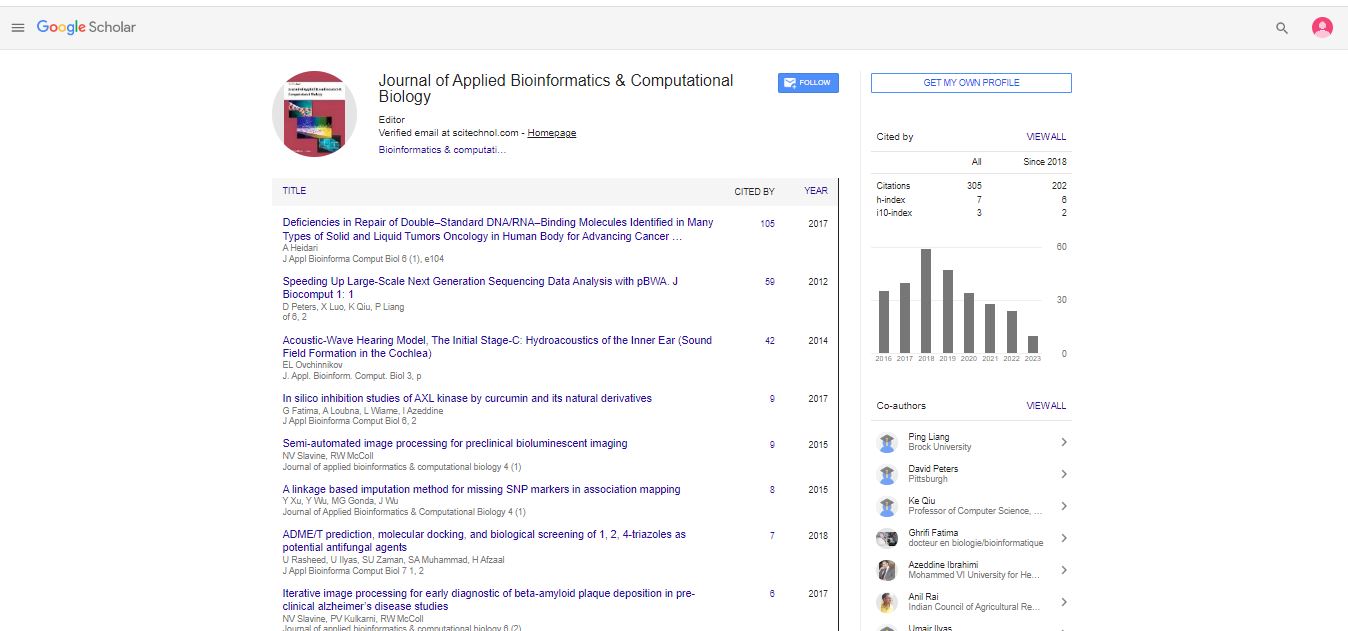Commentary, Vol: 12 Issue: 3
Applications of DNA Technology in Reshaping Science and Medicine
Rahul Varma*
1Department of Biology, Madras Institute of Technology, Anna University, Chromepet, Chennai, India
*Corresponding Author: Rahul Varma,
Department of Biology, Madras Institute of Technology, Anna University,
Chromepet, Chennai, India
E-mail:varma2775@gmail.com
Received date: 27 May, 2023, Manuscript No. JABCB-23-107647;
Editor assigned date: 29 May, 2023, Pre QC No. JABCB-23-107647 (PQ);
Reviewed date: 15 June, 2023, QC No. JABCB-23-107647;
Revised date: 23 June, 2023, Manuscript No. JABCB-23-107647 (R);
Published date: 30 June, 2023, DOI: 10.4172/2327-4360.1000267
Citation: Varma R (2023) Applications of DNA Technology in Reshaping Science and Medicine. J Appl Bioinforma Comput Biol 12:3.
Description
Deoxyribo Nucleic Acid (DNA) is the blueprint of life, serving as the fundamental genetic code that defines all living organisms. In recent years, the advent of revolutionary DNA tools has transformed scientific research and applications across various fields. From unraveling mysteries of the past to diagnosing diseases and even altering the genetic makeup of organisms, DNA tools have become indispensable in the modern era. In this article, we explore the fascinating world of DNA tools, their diverse applications, and the profound impact they have on our lives.
One of the most significant breakthroughs in DNA research is the development of DNA sequencing technology. DNA sequencing allows scientists to read and interpret the order of nucleotides in a DNA molecule, providing invaluable insights into an organism's genetic makeup. The completion of the Human Genome Project in 2003 marked a pivotal moment in history, enabling researchers to understand the entire human genetic code.
Advancements in sequencing techniques, such as Next-Generation Sequencing (NGS), have drastically reduced the time and cost required for sequencing DNA. This has opened up new avenues for personalized medicine, genetic disease diagnosis, and even the identification of ancient human ancestors through DNA extracted from fossils.
DNA profiling, also known as DNA fingerprinting, has revolutionized forensic science and criminal investigations. The technique involves analyzing specific regions of an individual's DNA to create a unique genetic profile. This profile can then be compared with DNA evidence found at crime scenes, identifying potential suspects or exonerating innocent individuals.
The accuracy and reliability of DNA profiling have led to numerous convictions of criminals and the exoneration of those wrongfully accused. Additionally, DNA databases have been established worldwide, aiding in the swift identification of suspects and missing persons.
The discovery of DNA's structure in the 1950s paved the way for genetic engineering, a field that allows scientists to manipulate DNA for various purposes. Recombinant DNA technology, which involves combining DNA from different sources, has enabled the production of valuable proteins, such as insulin and growth hormones, through Genetically Modified Organisms (GMOs).
Moreover, the CRISPR-Cas9 system has emerged as a groundbreaking tool for precise gene editing. Its simplicity and efficiency have significantly accelerated genetic research and allowed the potential correction of genetic defects responsible for inherited diseases.
Biodiversity conservation and species identification have been significantly enhanced by DNA barcoding. This technique involves identifying species based on short, standardized DNA sequences. By using specific genetic markers, scientists can rapidly identify and catalog a vast array of organisms, even those that are morphologically similar or difficult to distinguish. DNA barcoding has applications in wildlife forensics, monitoring illegal wildlife trade, assessing ecosystem health, and streamlining biodiversity surveys. It has proven particularly valuable in identifying endangered species and protecting them from extinction.
The study of ancient DNA, also known as aDNA, has reshaped our understanding of human history and evolution. By extracting and sequencing DNA from ancient remains, scientists can trace the migration patterns of ancient populations, identify extinct hominin species, and shed light on the genetic origins of modern humans. DNA analysis of archaeological samples has also provided insights into the domestication of plants and animals, revolutionizing our knowledge of early agricultural practices and the development of ancient civilizations.
DNA nanotechnology represents a remarkable intersection of biology and engineering. Scientists have harnessed the unique properties of DNA molecules to construct nanoscale structures and devices. These nanostructures have potential applications in drug delivery, nanoelectronics, and even the creation of artificial enzymes.
Additionally, DNA origami, a technique where DNA strands are folded into complex shapes, has paved the way for innovative nanoscale engineering, enabling scientists to design and build tiny structures with precise control. DNA computing is an emerging field that explores the use of DNA molecules to perform computations. Harnessing the immense information storage capacity of DNA, scientists envision a future where DNA-based computers could solve complex problems that are currently beyond the capabilities of traditional computers.
While still in its infancy, DNA computing holds great promise for cryptography, optimization problems, and data storage. The inherent parallelism and data density of DNA molecules make it an intriguing candidate for pushing the boundaries of computing technology. DNA tools have unlocked a new realm of possibilities in science and beyond. From sequencing genomes to engineering life forms, and from solving crimes to preserving biodiversity, these powerful tools have touched almost every aspect of our lives.
The continuous development of DNA technology promises to bring even more groundbreaking advancements in the future, shaping the world in ways we could only imagine a few decades ago. As we delve deeper into the intricacies of the genetic code, it is essential to recognize the ethical implications and responsibilities that come with wielding such formidable power over the very essence of life. As scientists and society move forward together, the potential of DNA tools to create a brighter, healthier, and more sustainable future is indeed awe-inspiring.

